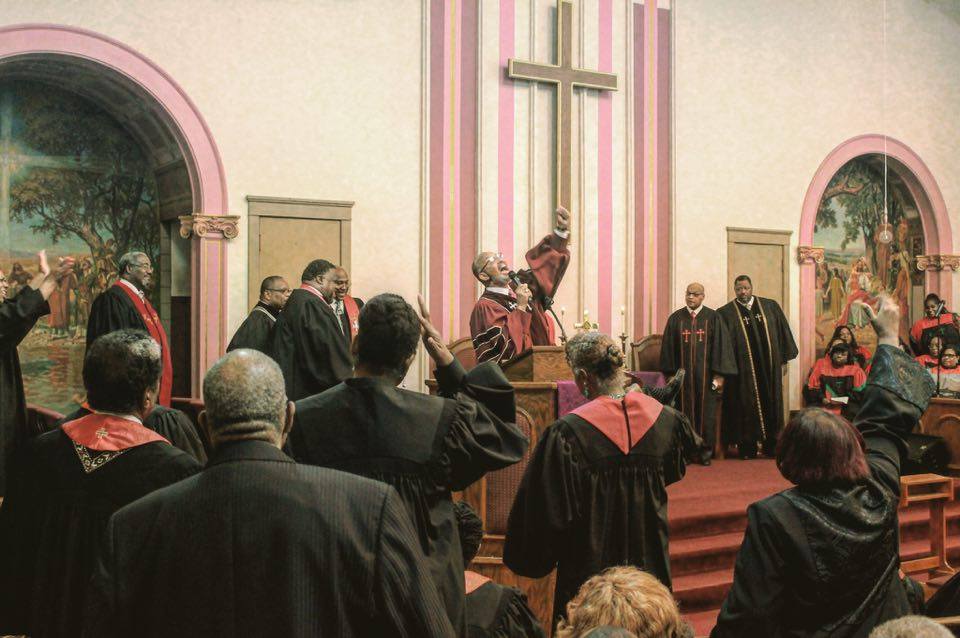Has the Black Church Lost Its Power?
Preachers need to frankly discuss the issues we face, as they did in the past.

Local and national pastors and ministers preach at Tabernacle Community Baptist Church. Photo by Byron Johnson.
White dresses, white hats, black suits, black ties, big colorful robes, big chairs, long pews, choirs swaying, mothers and deacons with reserved seats up front, pastors and preachers jumping up and down with charismatic speeches, and people everywhere you turned!
For me, this was life! It was church on Sherman Boulevard Sunday mornings at 10:45 a.m. that formed my foundation and identity in faith. While gazing at the big stained glass windows as mom and I sat on the fourth pew down on the right side, it always felt like that was where I was supposed to be! While getting dressed, you knew what to expect. There was a sense of pride and respect for Sunday mornings. Your steps were a little lighter. You walked a little straighter. Your speech was correct. You were on your best behavior — because you were going to church. But for many, particularly in the black community, this holy routine may sound like a distant memory, nearly forgotten in recent years.
“Christians and church go together. We cannot have one without the other,” said a local Milwaukee pastor during a recent “Brotherhood Sunday” worship service.
For most black folk, it has long been a source of identity to say you were a churchgoer. It is the place where you gather for a central reason: God. Where you can let go of thinking about the burdens and worries of the week, and be a part of a community where you can pray and gain hope, be encouraged, be enlightened, and be somebody.
The church has always been there. Even within the heartbeat of the civil rights movement, the unity of people and the organization of the black sacred space was the backbone of power and transformation. The black church stood and fought for the morals and values that were necessary for the quality and equality of every life. It was unapologetically who it was. Providing life within itself, it served its people with what the outside world would not give them. It was a space for opportunity, education, arts, business and family. Pride and relationship to the black church was built upon these foundations.
In Milwaukee, in this 21st century, this affection remains for many individuals. In many ways, the chaos we face today is not terribly different than other trying times in our history. And older generations understand this. However, there seems to be a major gap in commitment and dedication to the church. And I don’t think it’s because folks merely want to sleep in on Sunday morning. As a new society arises, new language surfaces about “church” with the unveiling of a few issues. Actually, a lot of issues. And I believe these issues have far too long been important. The church, NOW, needs to have the “mirror-talk.”
“Why is the church so quiet about racism?” “Why does prosperity seem more important these days?” “Is the black church dead?” “Much of my abuse came from the church because I was gay.” “What does the church have to say about all the killings in our city?” “Is the church effective anymore?” “Has the church lost its identity?” “I’m no longer religious, but I am spiritual.” These statements and questions stem from popular conversations in the new-age society as of late that critique the role of the church in our community. The volume of these particular conversations continues to elevate, as real-life issues become the magnifying glass through which individuals critically examine the church and relationship to the divine.
In my opinion, the church can no longer be scared to have the conversation about how to embrace the problems in our city and our world in a more relevant and effective way. #BlackLivesMatter, HIV/AIDS, LGBTQA rights, depression and mental illness are just the tip of the iceberg of what needs the church’s attention. But have we been too quiet?
If the church is to remain relevant we must examine its call to power. We must examine the church’s intergenerational relationships and seek ways to mend the gap. Then we have to envision the church’s future in changing societies. It’s time to get uncomfortable in many of our self-serving traditions and look outward to develop transformative strategies for the neighborhoods and streets we live in. Church, let’s have the conversation!
Byron Johnson is a native of Milwaukee and is a candidate for licensed ministry at Tabernacle Community Baptist Church. He graduated from American Baptist College in Nashville, where he studied Bible and theology. In this piece, he discusses the prominence of the black church in his life.
This story was originally published by Milwaukee Neighborhood News Service, where you can find other stories reporting on eighteen city neighborhoods in Milwaukee.
Op-Ed
-
Wisconsin Candidates Decry Money in Politics, Plan to Raise Tons of It
 Dec 15th, 2025 by Ruth Conniff
Dec 15th, 2025 by Ruth Conniff
-
Trump Left Contraceptives to Rot; Women Pay the Price
 Dec 8th, 2025 by Dr. Shefaali Sharma
Dec 8th, 2025 by Dr. Shefaali Sharma
-
Why the Common Council’s Amended Budget is Good Policy for Milwaukee
 Nov 20th, 2025 by Alds. Marina Dimitrijevic and Russell W. Stamper, II
Nov 20th, 2025 by Alds. Marina Dimitrijevic and Russell W. Stamper, II






















Dude! Lots of good points here. But why do the neighborhoods with the most churches, traditional or storefront, have the highest crime rates? I’m tired of blaming God for this sh*t. It is about time parents took responsibility!
I am sure that many of the Black Church are well-meaning and do benefit the community, but the stranglehold that religion has on its followers has a huge net negative effect. The 53206 ZIP code has high concentrations of poverty– but “rich” in the number of churches. There are far too many parasitic preachers enriching their coffers while victimizing the poorest in the community. You know the ones who live in luxury with your dollars– God received not a penny!
If only sermons and prayers were effective, but “Nothing Fails Like Prayer”.
This times a million.
It boggles the mind that Christianity is so entrenched in the African American community, especially when you consider that it was literally beaten and raped into their ancestors. It would be like future Palestinians converting en masse to Judaism.